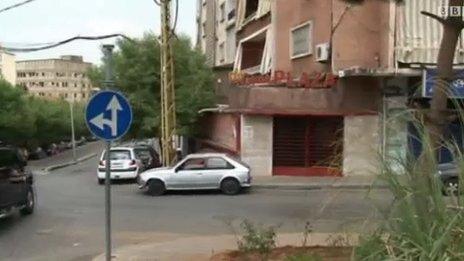Outraged Lebanese demand end to anal exams on gay men
- Published

Gay-rights activists in Lebanon are calling on the authorities to stop performing anal examinations on men suspected of having "sexual intercourse contrary to nature". The BBC's Carine Torbey in Beirut says a recent incident has sparked public outcry.
It started with a raid by police on a cinema in one of the poorest districts of Beirut, following claims on a television show that it was a "gay house".
Thirty-six people were arrested. All of them were subjected to an examination by a doctor at a police station.
The scale of the operation, and the subsequent outcry, brought the issue of such tests to mainstream attention.
"It's the republic of shame," stated the opening line of a scathing introduction to the evening news bulletin on the privately-owned Lebanese Broadcasting Corporation (LBC).
And the indignation was quick to spread.
On Facebook and Twitter and by email, many Lebanese shared clips from the introduction of the bulletin - an indication of the shock caused by the incident.
For the first time, it was not only gay-rights activists who were debating and condemning the practice but mainstream society.
"I'm not someone who supports gay rights but this is extremely disgraceful. What kind of country do we live in," one 40-year old woman said.
Memorandum
Lebanon's Justice Minister, Shakib Qortbawi, was quick to take action.
"From a humanitarian point of view, this is totally unacceptable," he told the BBC.
"Immediately after I saw the TV report, I sent the prosecutor-general a letter asking for clarifications. And later on, the prosecutor-general issued himself a memorandum."
The memorandum is vaguely written but appears to call for restraint in the application of the tests.
The move was met with a great deal of scepticism by the country's gay community, which demands nothing less than a total ban of the tests.
Helem, a lesbian, gay, bisexual, and transgender (LGBT) group, is stepping up the pressure and calling for a demonstration in protest against the tests.
'Against nature'
There is no law that criminalises homosexuality in Lebanon. But people can be charged under Article 534 of the Lebanese Penal Code, which penalises "sexual intercourse contrary to nature" - specifically sexual intercourse that includes anal penetration - with a maximum of one year in prison.
Examination results have been used as evidence to charge people with having illegal intercourse, despite the fact that many doctors who undertake the exams are not convinced at all that they hold any medical or scientific weight.
Dr Hussein Chahrour, head of the Lebanese Association for Forensic Science, has been conducting examinations since the 1990s.
Without hesitation he told the BBC: "These tests prove absolutely nothing. Their scientific value is nil, particularly because they are visual consultations - the doctor takes a look at the rectum of the arrested person and writes his report."
Asked why he carried out such examinations, Dr Chahrour replied with an air of resignation: "I just implement the orders of the office of the prosecutor-general."
'Homophobia'
For the gay community in Lebanon, the message is clear.
"It's rape by doctors upon the request of the prosecutor-general," said Charbel al-Maydaa from Helem. "This is another homophobic practice aimed at intimidating the gay community in Lebanon."
"It also runs against the principle of the presumption of innocence accorded to the accused person. Here they're trying to prove his culpability rather than his innocence," he added.
Mr Qortbawi is also adamant that the tests are bad practice.
A veteran lawyer, he is proud of his record in defending human rights in Lebanon and appears to be satisfied with his role in issuing of the memorandum.
But what about Article 534 of the penal code?
"That's a completely different issue," Mr Qortbawi insisted. "The law is a mirror of society. And I think we still need a lot of time before we get that far."
- Published26 May 2006
- Published29 August 2005